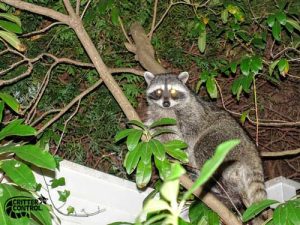
Known for their keen scrounging ability that often involves breaking into trash cans and kitchen windows, raccoons can cause all sorts of damage if they manage to get into your Massachusetts property. To prevent excessive damage to your home and landscaping, here are some preventative measures as well as raccoon trapping and raccoon removal tips that you can employ.
3 Tips for Nuisance Raccoon Removal and Prevention
Removing a raccoon yourself can be tricky considering that raccoons like to stay in tight, hard-to-reach spaces. If you suspect a raccoon is living on your property, follow these preventative measures to ensure it does not enter your home:
- Secure your property. Fence in your yard, garden, or porch to keep raccoons out and away from your home. Ensure your fence does not have any holes in it that raccoons can squeeze through. It is also recommended that each fence is buried about three inches underground to keep raccoons from digging underneath.
- Safeguard your home. The best method to ensure raccoons remain outside your home is to ensure there are no entry points. Seal any holes on your home’s exterior, check your attic and roof for exposed vents and cracked soffits, and install a chimney cap to keep raccoons out.
- Properly store your trash. Raccoons love to get into trash cans and litter yards with garbage, creating a big mess for you to clean up. Ensure that your garbage can lids are tightly secured while outside overnight and remove any pet food bowls that could attract hungry raccoons.
These recommendations will only help prevent raccoons from entering your property; however, if a raccoon has already made its way into your home, then the only way to remove it is with professional trapping.
The Dangers of DIY Raccoon Trapping
Trapping a raccoon is difficult, dangerous, and stressful to attempt on your own. Raccoons are known carriers of rabies and other diseases that can be transmitted to you if you are bitten or scratched. Furthermore, there are laws and regulations that must be followed when trapping, removing, and releasing an invasive raccoon.
Therefore, raccoon trapping and raccoon removal should only be performed by a wildlife control professional. To trap a nuisance raccoon, professionals will place and anchor a cage or sturdy box trap in areas that the raccoon has been disturbing. For bait, they will use cherries, grapes, marshmallows, or jelly to reduce the chance of catching non-target animals.
To remove raccoons from your property quickly, safely, and efficiently, rely on the expert raccoon removal and raccoon trapping methods of the wildlife professionals at Critter Control® of Boston.
Expert Massachusetts Raccoon Removal
If you are dealing with a nuisance raccoon on your Greater Boston area property, it is best to leave its removal and trapping to the experts. The experienced pest control professionals at Critter Control® of Boston are the safest and most efficient option to remove nuisance raccoons from your property and keep them from returning.
To schedule your inspection and receive a free estimate for our services, call Critter Control® of Boston today at 617-975-0440.




